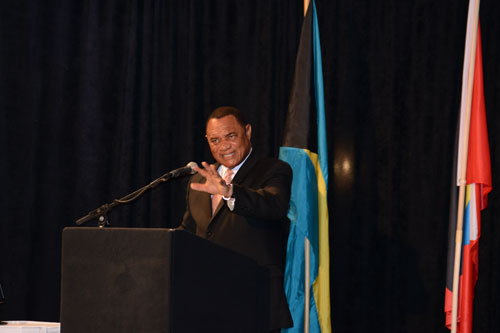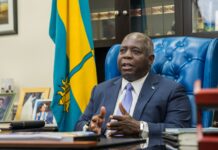Christie Delivers an impressive lecture on legal calendar…

Remarks by
The Rt. Hon. Perry G. Christie, M.P.,
Prime Minister
The 8th Annual
Dr. the Hon. Lloyd Barnett O.J. Lecture
His Excellency the Governor General Sir Arthur Foulkes and Lady Foulkes, Colleague Ministers; Senators; Chief Justice the Hon. Sir Michael Barnett; President of the Court of Appeal Madam Justice Anita Allen; Ms. Jacqueline Samuels-Brown QC, Chairperson of the Council of Legal Education; Principals of the Norman Manley, Hugh Wooding and Eugene Dupuch Law Schools; faculty members; senior members of the Public Service; students, ladies and gentlemen, good evening.
I am honoured to have been invited to deliver the 8th annual Dr. Lloyd Barnett Distinguished Lecture, an important fixture in the Caribbean legal and academic calendar. This annual Lecture is, of course, named in recognition of the outstanding legal career and accomplishments of a great Caribbean lawyer and constitutional scholar, Dr. the Hon. Lloyd Barnett.
Let me at once disclose that Dr. Barnett has been a personal friend of mine for many years. Indeed he has been a good friend of The Bahamas, and an important contributor to the development of our jurisprudence, going all the way back to 1972 – fully 41 years ago – when he first appeared in our courts as the junior to the late Vivian Blake QC, in representing the Progressive Liberal Party candidate, Philip Smith, in an Election Court case. I should add that Mr. Blake’s other junior in that case was retired Supreme Court Justice, Rubie Nottage, a present member of our Constitutional Review Commission.
For those of you who are visiting and may not know, the Progressive Liberal Party or PLP is the governing party of The Bahamas of which, by the grace of God and the suffrage of the Bahamian people, I happen to be the Leader.
Indeed, in the interests of being entirely candid with you, I feel that I should also disclose, however lacking in tact it may be for an apolitical occasion such as this, that in the more than four decades that have ensued since Dr. Barnett first appeared in our courts here, my party has had a complete lock on his services in election court matters – much to the regret, I am sure, of the parties opposite.
I also need to make disclosure of another fact, one that I suspect is less well known, namely, that in no small measure I owe my political resurgence in the early-to-mid-1990s to Dr. Barnett for it so transpired that in the Commission of Inquiry of 1993-1995, it fell to me to lead the defence of the late Sir Lynden Pindling – not by design but by default. Sir Lynden had actually engaged Dr. Barnett to lead the case, with me as his junior. However, my application to the Chairman of the Commission, the late Sir William Douglas, to stand the matter down until Dr. Barnett was free to come to Nassau was dismissed out of hand. I can well remember Sir William saying something like “Come, come, Mr. Christie, a junior of your seniority at the bar should be more than ready to carry on with the case”. In fact, he insisted that I do so. And indeed I did. And by most accounts I acquitted myself sufficiently well to win for myself a much enlarged circle of admirers within my Party and, of infinitely greater consequence, I thereby became Pindling’s Anointed One! And the rest, as they say, is history.
I have never forgotten that I owe the fortuitous trajectory of which I speak to Dr. Lloyd Barnett who, as fate would have it, happened to be tied up with other matters in the Caribbean, leaving me to exploit his absence to my own advantage. It was a twist of fate that I have never regretted although to my certain knowledge others have.
But it really is a very great pleasure and honour to be here with you this evening to give this Lecture, named in honour of a valued personal friend, an esteemed friend of The Bahamas and one of the most brilliant stars in the constellation of legal luminaries not only in the Caribbean but in the wider Commonwealth as well. Indeed Dr. Barnett is one of that rarest of breeds: a lawyer who is as equally adept in the courtroom as he is in halls of academia. He is at once an advocate par excellence and a legal scholar of world renown.
Distinguished Guests, Ladies and Gentlemen:
This lecture comes on the heels of the anniversaries of two very significant historical events for The Bahamas. These events radiated from different sides of the Atlantic, and were separated in time and history, but their connectedness nonetheless lies in common aspirations to freedom—one of a nation, one of a race—and both were hammered on the anvil of race and class struggle.
The first event of which I speak is the recent celebration of the 40th anniversary of independence of The Bahamas from Great Britain in 1973, under a black majority government led by the late Rt. Hon. Sir Lynden Pindling.
Then, a little over a week ago, as the guest of Elder Berniece King (the daughter of famous civil rights leader Dr. Martin Luther King Jr.) I was deeply honoured to have been the only foreign leader invited to bring brief remarks at the commemoration of the 50th anniversary of the march on Washington, and to do so in the shadow of the Lincoln Memorial just steps away from where Dr. King himself delivered his immortal “I Have A Dream” speech.
The common struggles evinced by these two events link our past, present and future.
I now turn to he topic that I have been invited to speak to this evening:
“Contemporary constitutionalism and the consent of the Governed”
Arguably the most significant constitutional phenomenon to occur in our region in recent years has been the use of the ballot box by various Caribbean electorates to deny their consent to constitutional reforms advocated by their executive governments and national legislatures.
Indeed the referendum device as an agent of constitutional change has become such an unruly horse in Caribbean politics that politicians everywhere in our region can perhaps be forgiven for approaching the matter of constitutional reform with enormous apprehension, uncertainty and even bewilderment.
Recently, there was a collective sigh of relief in St. Lucia, perhaps echoed within CARICOM generally, when the OECS Court of Appeal ruled that it was not necessary, as a matter of constitutional law, to have a referendum on a bill that would allow St. Lucia to join the Caribbean Court of Justice . But for this judicial intervention, the question would have had to be submitted to the electorate, with all the attendant uncertainty as to its outcome.
Against that backdrop and other constitutional reform exercises that I will turn to in just a moment, I would like to pose a series of questions concerning the role of the popular referendum in the process of constitutional reform, and to examine its implications for the Westminster model that continues, of course, to be so central to the constitutional systems of most of the Anglo-Caribbean.
Caribbean constitutional scholars and Governments alike are considering questions such as the following: militate
• Has the use of the entrenchment devices in the Caribbean and, in particular, the referendum requirement, militated against much needed constitutional reform?
• Is the referendum requirement inimical to the core-principles of the Westminster model to which most of us in this region still subscribe ?
• Can Caribbean governments, operating as they do in politically polarized cultures, realistically hope to achieve the kind of multi-party consensus without which popular support for constitutional reforms is hardly likely to be achieved in a referendum?
These questions have no easy answers, and let me at once forewarn you that my address to you this evening may leave some of them unanswered to your satisfaction.
As many of you would recognize, the phrase “the consent of the governed” harkens back to the opening lines of the American Declaration of Independence, penned by Thomas Jefferson in 1776. The Declaration of Independence begins with these words:
“We hold these truths to be self-evident. That all men are created equal. That they are endowed by their creator with certain inalienable rights. That among these are life, liberty and the pursuit of happiness. That to secure these rights, governments are instituted among men deriving their just powers from the consent of the governed.”
In the Jeffersonian ideology, the “consent of the governed” posits the central concept that government, in its most ideal form, should be grounded in and legitimized by popular consent, that is to say, the consent of the governed, a political theory much popularized by the 16th and 17th century writings of Hobbes, Locke and Rousseau.
The Jeffersonian concept of constitutionalism also gives primacy to individual rights and the right of the people to be the ultimate masters of their government. This, in turn, informs the whole approach to constitutional interpretation which goes beyond just looking at a particular constitutional text. Instead it imports the wider philosophical notion that governments and rulers should use the executive and legislative power of the state to promote the public weal and promote a well-ordered society for the good of the individuals who collectively comprise that society.
In terms of our own constitutional ethos, we in The Bahamas and in the wider Caribbean are driven by much the same overarching concern: to continue our quest for a constitutional paradigm that reflects popular ideals and aspirations consistent with our devotion to democracy; and promotes governance in a way that will endure to both individual self-fulfillment and the peace, order, and welfare of the society as a whole.
But such a constitutional paradigm involves an intrinsically dynamic and evolutionary process; one that lends itself to of reform and revision, adaptation and change over the course of time.
As the Chairman of the Constitutional Commission of The Bahamas, Sean McWeeney QC, recently remarked at a town hall meeting :
“ Although some of our founding fathers would have you believe otherwise, the Constitution is not holy writ. It is not the Bible. It is not the work of God but of man. And what man does is subject to error. Experience can demonstrate that something was wrong for us from the very beginning or it can develop cracks over time, making it unsafe or unwise to continue with it. We should not be blinded by what was cast in stone 40 years ago but rather by what the constitutional experience of the ensuing 40 years has taught us. This means that we have to be prepared to periodically re-examine our Constitution with fresh eyes and open minds, and if we find that something isn’t working, we must not be afraid to admit it, and to change it”.
As put by the late Caribbean Professor of jurisprudence, SCR McIntosh, the aim of constitutional amendment should be to make changes “that experience reveals to be required by justice or the general good, in order to strengthen the political values to which the society has committed itself.”
While these theoretical constructs may provide the academic underpinnings for this lecture, my main focus this evening is something far less abstract. It is rooted in the experience of actual constitutional review and reform in The Bahamas and elsewhere in the region.
Let me start, though, with the comparatively recent experience of the phenomenon of popular resistance to constitutional change in The Bahamas.
During 2002, under the Ingraham administration, a compendium of Bills to amend the Constitution of The Bahamas was tabled and passed in both Houses of Parliament, with the requisite special majorities. Ultimately, however, the entire constitutional reform initiative was essentially nullified when the main bills were rejected in a referendum.
It bears noting that this initiative represented the first substantive attempt at Constitutional reform in the post-independent Bahamas.
The proposed reforms, it bears remembering, dealt with a miscellany of matters covering such diverse subjects as gender equality in citizenship matters; extension of the retirement age of Judges; and the creation of various bodies, such as an independent DPP; a new Teaching Service Commission; and an independent Boundaries Commission.
At first blush these might all seem relatively non-controversial being changes of a type which most “right-thinking” people would likely be disposed to agree with. However that may have been, the constitutuional reforms failed to win the support of the majority of the electorate in the referendum.
Earlier this year, there was another referendum in the Bahamas, albeit a non-constitutional referendum, the first of its kind in our history. For the record, I need to say that this referendum – the gambling referendum, as we like to call it – can be laid at my feet even though the official position of my government was one of neutrality on the referendum questions.
As I have said, this was not a referendum aimed at altering any provisions of the constitution (although obliquely it had possible constitutional ramifications). Nonetheless, it involved social and political dynamics of the kind that are likely be evident in any referendum, be it constitutional in the formalistic sense as it was in 2002 or non-constitutional in nature.
As you would be aware, a majority of voters voted “NO’ to the questions that were put in the gambling referendum.
I need to emphasize that in both the 2002 constitutional referendum and the 2013 gambling referendum, there was a complete absence of consensus among the main political parties. This fact alone, given the acute political polarization of Bahamian society, may well have pre-ordained the failure of both initiatives.
The demonstrated pattern of popular resistance to reforms urged by the political directorate and the legislature is not, however, unique to The Bahamas. Nowhere has this been more evident than in St. Vincent & The Grenadines where, in 2009, following almost a decade of methodical work, public education, consultation, and discussion by a Constitutional Reform Commission, a new constitution was put to a plebiscite only to be roundly rejected.
Commenting on that outcome in an article published in 2011 in the British Journal of Politics and International Relations, political scientist, Matthew Louis Bishop, of the Institute of International Relations, University of the West Indies, wrote:
“[T]here is some irony in the fact that Gonsalves’ [Prime Minister Ralph Gonsalves] failure in the November 2009 plebiscite turned on whether or not he could marshal a two-thirds majority of ‘yes’ votes rather than a simple majority. For the PM, this was a requirement placed in the original Vincentian constitution by the British specifically to neuter radical approaches to governance in the early post-independence era….. A more charitable interpretation is that, in fact, the two thirds clause was an attempt by the British to ensure that major constitutional changes would be undertaken consensually with cross-party support.”
In Grenada, after significant public engagement and the drafting of a new republican constitution by the Constitution Reform Commission, the Government took the decision to defer the required constitutional referendum until 2015. More recently, the Grenadian Government has announced that it will re-constitute the Constitutional Reform Commission and give it a two-year mandate, with the CCJ being among its top priorities for consideration.
The unpredictability and apparent arbitrariness of Caribbean electorates have prompted a distinguished UWI Professor, Rosemary Bell-Antoine, to caution governments against putting matters relating to the future of the Caribbean Court of Justice in the hands of the public through a referendum, highlighting the 2002 results from The Bahamas as a classic example of how such a process can become derailed.
It is instructive to look at what Professor Bell_Antoine is reported to have said:
“Very often in terms of a referendum, what happens is that it becomes politicized and you forget what the real issue is. I can give you some concrete examples; St. Vincent had a referendum and it became polarized on political grounds, and the people failed to implement the CCJ in 2009. But my favourite example is in The Bahamas…some years ago there was a referendum to correct a provision in the Constitution which was discriminatory against women. […] This ought to have been a simple issue where the man in the street would normally have agreed that it discriminated against women so let’s change it. But instead it became political….”
To be sure, each of these results can best be explained in the unique context of local political idiosyncracies prevalent at the time. Still there are important inferences to be drawn which may be of general application throughout the region, going forward.
All of the Constitutions of the independent countries in the Commonwealth Caribbean contain entrenchment machinery that protects the more important provisions of the Constitution from change by requiring special super-majorities to be obtained in Parliament, after which the affirmative vote of the electorate still needs to be obtained in a referendum. In fact, as the McWeeney Commission has pointed out, some 104 of the 137 articles of the Bahamian constitution are entrenched or specially entrenched, including the entrenchment clause itself.
The McWeeney Commission and others have invited consideration of the rationale behind the variety of entrenchment formulae and devices. For example, why have two levels of special parliamentary majorities (2/3rds for some matters and ¾ths for others) – both of which are generally not difficult to attain in countries where the governing party often holds an overwhelming majority in parliament, but then require approval of only a simple majority of the people in a referendum?
The variable entrenchment devices also highlight the paradoxes and disproportionalities that are frequently manifested in the Westminster system in the political context of the Caribbean. For example, disproportionality frequently appears in the first “past-the-post” system where the government of the day controls a significant majority in Parliament although in reality it may only have attracted a narrow majority of the popular vote. Winning a close majority of the popular vote in a general election will generally portend extreme difficulty in ever obtaining a majority of the electorate in a constitutional referendum.
In fact, the relatively low voter turnout for referenda, as compared to that for general elections, raises other issues. For example, in the case of the 2009 referendum in St. Vincent and the Grenadines, the voter turnout was only 54 per cent. In the recent referendum held in The Bahamas, the turnout was only 45.58 % of the registered voters, compared with the turnout at general elections, which in the 2012 elections was over 90%, a percentage that, give or take, has generally held steady indeed for all general elections since the attainment of majority rule in 1967.
Indeed one can ask whether there is a point at which the voter turnout in a referendum so low that it cannot be considered sufficiently representative of public opinion to constitute a popular mandate for or against the change in question? At what point should the moral legitimacy of the result be called into question.
Another problematic issue with referenda is that “special interest” groups can inject themselves into referendum debate and if sufficiently motivated and resourced, can exert a significant, possibly even decisive, influence on the outcome of the vote.
The requirement of a referendum also involves quite considerable costs for small and/or financially distressed developing states within our region. Also, having regard to the nature and range of proposed constitutional changes, it may be necessary to hold not one but a series of referenda, as indeed is the recommendation of the McWeeney Commission in relation to the many changes it has proposed, lest the electorate suffer from overload or question-fatigue. Such an approach, however commendable and however necessary as a practical or logistical matter, does necessarily involve even more considerable public expenditure.
Apart from such things, however, and more broadly speaking, we really do need to focus on the whole process of constitutional reform in the context of the primacy that must, in my view, be accorded to the consent of the governed.
A useful point of reference to this line of inquiry is to be found in the following criticism in the Report of the McWeeney Commission:
“While it is undoubtedly correct that constitutional provisions should not be easily disturbed, the Commission is of the view that the amending clause of the Constitution is far too rigid, and may have the effect of making the Constitution almost immutable. […] Governments must have room to govern, and no government can govern effectively by a process of referendum that is too pervasive. ”
In particular, governments must acknowledge the necessity to evolve and adapt to changing circumstances within the domestic legal sphere and within the international legal order as well – and in ways, moreover, that may require constitutional change.
Indeed in the case of The Bahamas, there is a conflict between the norms of international law and domestic law in certain important respects that cannot be left unremediated.
A striking example of this dissonance is reflected in the Convention on the Elimination of All Forms of Discrimination against Women (CEDAW), which is sometimes called the Bill of Rights for Women. The Bahamas acceded to the Convention on 6 October 1993, becoming the last country in the Caribbean to do so . In doing so, The Bahamas entered reservations to those provisions of the Convention which require states to amend their Constitutions and laws to grant women formal equality with men in all respects, including the ability to confer citizenship upon their children. Under our present Constitution, however, there is no such gender equality although the McWeeney Commission has recommended that this be corrected as matter of the highest priority.
More recently, The Bahamas signed the International Covenant on Civil and Political Rights in December 2008 and ratified it on 7th May 2009. Article 26 of this Convention provides for equal protection of the law and also prohibits discrimination on the ground of sex. Notably The Bahamas did not enter any reservations to this article, notwithstanding the gender inequality under our Constitution.
The larger point, however, is that as long as a Government is unable to obtain the majority support of the people to make the requisite changes to its constitution in order to meet its international obligations, it runs the risk of being stigmatized as a non-progressive country, possibly even a rogue-state.
Public International lawyers will also appreciate the trap this creates under international law: Article 27 of the Vienna Convention on the Law of Treaties recites the well known international principle that a state may not invoke the provisions of its internal laws as justification for its failure to perform its international treaty obligations. In this regard, it is arguably the case that the Constitution itself, containing entrenched provisions regarding citizenship, falls afoul of the Vienna Convention.
One of the defining hallmarks of Westminster, and perhaps the main reason the system has been generally successful in the context of small Caribbean states, is that sovereignty fundamentally resides in parliament. In constitutional theory at the least, the strong suit of the Westminster system has historically been the virtually limitless legislative capacity of Parliament. It is trite law, for example, that the words “to make laws for the peace, order and good government”, which are used to describe Parliament’s legislative remit “connote in British constitutional language, the widest law-making powers appropriate to a sovereign”, to use the classic formulation of the Privy Council in Ibrelebbe v The Queen [1964] AC 900 (923).
This holds true in the Caribbean as far as ordinary legislation is concerned but there are significant fissures in the doctrine when it involves the most fundamental legislative change of all: constitutional reform. The amending clauses for entrenched provisions, in particular the requirement for popular referenda, effectively limit, perhaps even cripple, the legislative capacity of Parliament. Indeed this is made clear in the Constitution itself insofar as it declares that the power of Parliament to make laws for the “peace, order and good government” is subject to “this Constitution” (which, of course, incorporates the referendum requirement for most constitutional changes).
Thus, in a very real sense, the referendum requirement makes the people the final check on the system for constitutional reform. While this may be as it should be when viewed from the high altar of fundamental democratic precepts, it has great significance for governance since it is the Constitution which prescribes the principles by which the people should be governed.
So, I would ask: Has the referendum phenomenon turned the concept of parliamentary sovereignty on its head?
Have recent Caribbean referenda demonstrated that the people are indeed sovereign and supreme having regard to what appears to be an increasing propensity to use the referendum as a means of letting governments know, between general election cycles, just who the real boss is?
Another friend and mentor of mine, the late Hon. Paul L. Adderley, recognized the difficulties and conflicts and dissonant notes of which I have spoken this evening, when he would say that constitutional law is the intersection of law and politics, and that sometimes it is more about politics than law.
And so what are governments in our region, faced with the critical imperative of constitutional reform, to do to ensure that they can obtain the consent of the governed?
I believe that public education and consultation must play an increasingly larger role in constitutionalism. This has been acknowledged by all the Governments of the Caribbean.
Indeed this is one of the reasons why the Government of The Bahamas has also decided to extend the life and mandate of the McWeeney Commission. Its many recommendations should be fully understood and digested by the electorate so that when called upon to make the final decision on them, the electorate can do so on a fully informed and rationally and carefully considered basis.
Indeed the extension of the McWeeney Commission’s remit will address the mischief contemplated by Professor Rosemary Bell Antoine, that is to say, preventing issues from becoming so “politicized [that] you forget what the real issue is”. By allowing the Constitutional Commission – largely comprised as it is of political non-combatants – to take the lead in explaining the constitutional issues and educating the public generally on the issues – may serve to reduce what would otherwise be the dominance of partisan political discourse, contaminated as it inevitably is by toxins that have absolutely nothing to do with the main constitutional dialectic.
Indeed I would submit that governments, working with civil society, must find effective ways to elevate issues of constitutional reform and change above the political fray, tapping instead into what Lincoln called “the better angels of our nature” where we can all meet on the common ground of patriotism and love of country, looking only to what is best for us as a people rather than as soldiers in some transitory partisan cause. It is my hope that law faculties in the Caribbean will monitor the effect of the involvement of civil society toward the ends that I have just described.
Finally, in considering the problems of constitutional reform and the politics of referendum, I could not help asking myself whether the referendum phenomenon is an historical irony (perhaps poetic justice). After all, in the Caribbean, peoples who had very little say in the making of their constitutions (other than indirectly through their elected representatives at the relevant independence conferences), are now utilizing the power of the referendum to assert their dominance in issues of constitutionalism in a way that was denied them at the beginning.
But however that may be, there can be no denying that Caribbean Governments must still find a way – a viable way – to amend their constitutions to make them more responsive and adaptive to changing circumstances and norms. In this regard, the twin challenges for us will be to achieve popular support for necessary constitutional change while at the same time retaining an effective legislative capacity that is the heart and soul of the Westminster system.
To achieve these objectives, we must remain committed to pursuing constitutional development based on a policy that stresses the primacy of the informed consent of the people, heavily utilizing for this purpose civil society and quasi-governmental mechanisms such as constitutional commissions rather than overly relying on the political parties as the main advocates and agents of change. When it comes to constitutional reform, a paradigm shift in this way may well offer governments their best chance of getting their legislative programmes for constitutional reform across the finish line. And the finish line in these matters is always obtaining “the consent of the governed”.
I thank you for your kind attention.







